














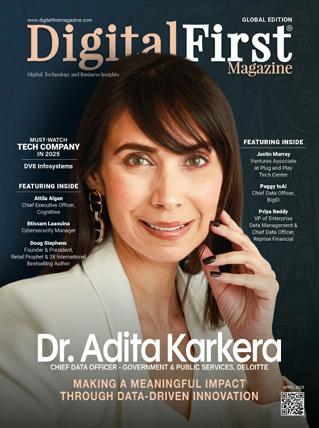
Afew weeks ago, while helping my niece with a school project, I found myself trying to explain what “data” really means. I compared it to digital breadcrumbs—tiny bits of information we leave behind every time we click, tap, or scroll. She looked at me, half amused, and said, “So the internet knows everything about me?” That hit me. She’s 11. And yes, it kind of does.
We’re all in that boat—leaving behind trails of information without always knowing where they lead or who’s watching. And in today’s world, where data drives almost everything, from healthcare to home deliveries, that’s a bit unsettling. So how do we move forward?
This issue of Digital First Magazine dives straight into that question. Because data isn’t just
lines on a spreadsheet anymore—it’s power, it’s currency, and yes, it’s responsibility. As businesses race ahead with AI tools, smart platforms, and cloud everything, the question is no longer if we can do something with data—but should we? And more importantly, how safely can we do it?
From privacy slip-ups to public mistrust, we’ve seen what happens when innovation runs faster than regulation. But there’s hope. A lot of it. Take our cover story, for example. Dr. Adita Karkera, Chief Data Officer at Deloitte Consulting LLP’s Government and Public Services, is proof that it is possible to lead with both brilliance and integrity. Her work— especially during her time as Deputy CDO of Arkansas—is a masterclass in using data to improve lives while respecting boundaries. In our exclusive interview, she talks about building data cultures rooted in purpose, not just performance.
You’ll also find stories of organizations navigating digital transformation with their eyes wide open—balancing opportunity with caution, speed with structure, and innovation with heart. They’re asking the right questions: What does ethical AI look like? Can we make cybersecurity more human? How do we keep trust intact while scaling fast?
At Digital First, we believe the smartest tech still needs the smartest humans behind it—leaders who see beyond the code and care deeply about the impact.
Enjoy Reading.

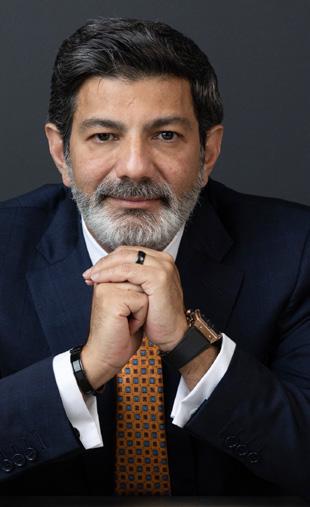
Bill Faruki, Founder & CEO of MindHYVE.ai and DV8 Infosystems
Leading the AI Revolution with Adaptive, Ethical, and Autonomous Intelligence


Designing the Future of Retail, Today
Doug Stephens, Founder & President, Retail Prophet & 3X International Bestselling Author
Attila Algan, Chief Executive Officer, Cognitiwe Driving Sustainable Solutions through AI


New Jersey’s Legacy of Innovation Will Continue
Justin Murray, Ventures Associate at Plug and Play Tech Center
Btissam Laaouina, Cybersecurity Manager How Ready is your Company to Handle the Growing


Peggy tsAI, Chief Data Officer, BigID
Pioneering a Brighter Future for Women in Tech
Priya Reddy, VP of Enterprise Data Management & Chief Data Officer, Reprise Financial



Dr. Adita Karkera has over 25 years’ experience and a proven record of successes in implementing data & AI strategies, policies & technology to solve business problems. Karkera currently serves as the Chief Data Officer for Deloitte Consulting LLP’s Government and Public Services. Previously, Karkera served as the Deputy Chief Data Officer for the State of Arkansas pioneering a data driven culture in the state. She has been nationally recognized by GovTech, StateScoop, Women in IT and others for her exemplary work. She also serves on many industry boards and forums and continues to strive for efficiencies in public service.
Recently, in an exclusive interview with Digital First Magazine, Dr Karkera shared insights on the role of data and technology evolving in government and public services in the next 5-10 years, her significant career milestone, future plans, words of wisdom, and much more. The following excerpts are taken from the interview.


Hi Dr. Karkera. What inspired you to pursue a career in data and technology, and what motivates you to continue innovating in this field?
Starting my career in the public sector was crucial for me. I was driven by a mission to improve the use of data for the public good, which has significantly shaped my career in data management. In 2000, I began working on data modeling, database maintenance, and data analysis for several complex government data systems. At that time, our primary focus was on creating reports based on aggregate data Were we using data to its fullest potential to drive decision-making and influence policy?
Probably not. However, this experience was incredibly significant as it demonstrated my ability and passion to handle data, address mission-critical problems, solve citizen-related issues, and enhance citizen experiences. This foundational experience ignited my passion for data management, and I have been hooked ever since. The continuous evolution of technology and its potential to transform public services keeps me motivated to innovate and push the boundaries of what data can achieve.
What do you love the most about your current role?
I have the best job because I get to work with cutting-edge technologies and innovative approaches to solve complex Government problems, which keeps me engaged and motivated every day. The rapid pace of technological change means I’m constantly learning and growing, which I absolutely love. My role is centered on creating trusted data & AI solutions and efficiencies for the public sector, and this focus is incredibly fulfilling.


Serving the public sector gives me a deep sense of fulfillment because I know that the work I do helps improve the public sector services. It’s about making a difference and that’s what I find most rewarding about my job.
How do you see the role of data and technology evolving in government and public services in the next 5-10 years, and what skills or expertise do you think will be essential for success in this field?
In the next 5-10 years, data and AI technology will continue to revolutionize government and public services by enhancing decision-making, streamlining operations, and improving citizen engagement. To succeed in this evolving landscape, professionals will need a strong curiosity about data, enabling them to explore new data sources & leverage AI tools effectively. By developing these skills and embracing continuous learning, professionals can harness the full potential of data and AI to drive innovation and improve public outcomes.
Over the course of your career, you have been a recipient of prestigious awards and accolades including Global Data Power Women (2024, 2023, 2022), GovTech Awards 2022, StateScoop 50 Awards 2021, and most recently Washington Execs Top AI Execs to Watch to name a few. Our readers would love to know the secret mantra behind your success.
I believe in the combination of passion, perseverance, and a commitment to continuous learning. The power of collaboration, as reflected in the proverb, “If you want to go fast, go alone. If you want to go far, go together.” is integral to me, allowing me to draw on the strengths and insights of others. Additionally, I

FOR THOSE LOOKING TO MENTOR, MY ADVICE IS TO BE GENUINELY INVESTED IN YOUR MENTEE’S SUCCESS, OFFER YOUR TIME AND EXPERTISE GENEROUSLY, AND CREATE A SAFE SPACE FOR OPEN DIALOGUE
owe so much to my sponsors and mentors. They have taught me to stay adaptable and open to new challenges in the ever-evolving field of data science and technology. Their guidance and support have been invaluable in helping me navigate my career and grow over the years.
Who has been a significant influence or mentor in your career, and how have they helped shape your professional journey?
My career has been shaped by the valuable influence of many mentors who have provided guidance, support, and inspiration in my journey. These relationships have played a pivotal role in my development as a leader in the data and analytics domain.
What has been your most careerdefining moment that you are proud of?
One of my most defining career moments was my service on Governor Hutchinson’s COVID-19 taskforce. This experience underscored the critical role of data in addressing the pandemic response. I felt fortunate to be at the forefront, actively contributing to the well-being of our citizens. This opportunity not only honed my leadership skills but also reinforced my deep passion for public service and my commitment to leveraging data as a catalyst for positive organizational transformation. Being able to serve our community during such a critical time solidified my dedication to making a meaningful impact through public service.
How do you prioritize your well-being and self-care amidst a demanding career?
I try to prioritize my well-being and self-care through regular meditation and exercise. These practices help me maintain balance, reduce stress, and stay focused.
How do you approach mentoring and developing the next generation of leaders in data and technology, and what advice would you give to someone looking to mentor or be mentored?
Mentoring and developing the next generation of leaders in data and technology is a responsibility I take very seriously. My approach is centered around creating a supportive and inclusive environment where emerging leaders feel empowered to explore their potential and take on new challenges. I believe in the power of active listening, providing constructive feedback, and fostering a growth mindset.
For those looking to mentor, my advice is to be genuinely invested in your mentee’s success, offer your time and expertise generously, and create a safe space for open dialogue.
For those seeking mentorship, I recommend being proactive in finding mentors who inspire you and align with your career aspirations. Be open to feedback, willing to step out of your comfort zone, and committed to your personal and professional growth. Remember, mentorship is a two-way street; it’s about building a relationship based on trust, respect, and mutual learning. Together, we can build a more dynamic future for the data and technology industry.
Bill Faruki isn’t just building AI—he’s shaping its future. As the Founder & CEO of DV8 Infosystems, and MindHYVE.ai and he stands at the forefront of Artificial General Intelligence (AGI) and swarm intelligence through Orchestrated Agentic AI, revolutionizing the entire AI industry by creating truly adaptive, autonomous, and ethical intelligence that evolves with businesses. His pioneering work has led to groundbreaking advancements in Autonomous General Intelligence (AGI), the next benchmark all AI companies are striving to achieve—far beyond Generative AI, which simply generates content without true adaptability, bringing AI closer to true adaptability and self-improvement.
The idea for DV8 Infosystems stemmed from a fundamental realization: businesses required AI
capable of keeping pace with the complexities of the real world. “Most AI solutions were too rigid,” Bill explains. “They struggled to handle the unpredictability of industries like finance, healthcare, and law. I founded DV8 Infosystems in 2020 to change that—by creating agentic AI systems that dynamically orchestrate workflows.”
Since then, DV8 Infosystems has evolved from a niche AI consultancy into a leader in industry-specific AI solutions, optimizing operations across multiple sectors. Key milestones include:
The launch of proprietary AI frameworks, including LawOps AI™, MedOps AI™, EduOps AI™, and FinOps AI™.
Expansion into global markets.
Strategic partnerships that have solidified DV8’s position in enterprise AI.

Bill Faruki, Founder & CEO of MindHYVE.ai and DV8 Infosystems

Looking ahead, Bill remains focused on pushing AGI capabilities forward while advocating for responsible AI development.
“Over the next five years, we’re expanding our AI ecosystem, advancing AGI, and helping shape regulatory frameworks to ensure AI is deployed responsibly,” he says.
For DV8 Infosystems, AI isn’t just about automation—it’s about transformation. The company’s name, “DV8,” reflects its core
philosophy: deviating from convention to create truly revolutionary solutions. Instead of simply accelerating existing processes, DV8 redefines them.
“We challenge traditional AI implementation by emphasizing adaptability, autonomous collaboration, and ethical intelligence,” Bill notes. “Our goal is to help clients achieve real transformation, not just marginal efficiency gains.”
Unlike generic generative AI solutions, DV8 has developed proprietary AI frameworks
designed to evolve, continuously optimizing operations in law, healthcare, finance, and education:
LawOps AI™ enhances legal workflows with automated research, contract analysis, case strategy, and compliance monitoring, allowing law firms to make data-driven decisions faster and more accurately.
MedOps AI™ improves healthcare with AIassisted diagnostics, predictive patient outcomes, and operational efficiency, reducing bottlenecks in medical institutions.
EduOps AI™ redefines education by enabling personalized learning pathways, AI-driven curriculum planning, and student engagement analytics.
FinOps AI™ empowers financial institutions with real-time risk analysis, fraud detection, and predictive market intelligence, optimizing decision-making and compliance.
XOps AI™ delivers tailored, enterprisegrade AI solutions designed to meet the unique challenges of any industry. Built on the same advanced intelligence as our other
AI frameworks, XOps AI ensures businesses across all sectors achieve seamless automation, operational efficiency, and strategic innovation. Each framework is built for adaptability, ensuring AI doesn’t just assist industries—it evolves with them. But DV8’s AI capabilities go beyond these frameworks. DV8 has 10 autonomous agents, each designed to streamline operations and adapt to unique business needs. For broader enterprise applications, DV8 offers XOps AI, a versatile solution that adapts to various operational needs, ensuring intelligent automation and optimization across diverse business environments. These agents work together as part of our swarm intelligence, leveraging Orchestrated Agentic AI to enable seamless collaboration and intelligent decisionmaking at scale.
Most AI solutions operate in silos, addressing isolated problems with predefined logic. DV8 Infosystems takes a different approach—
Instead of relying on rigid, rule-based automation, DV8 Infosystems builds agentic AI—AI that works autonomously, learns from its environment, and adapts in real time
teams to push the boundaries of AI while maintaining a steadfast commitment to ethics.
“AI governance, fairness, and transparency are non-negotiable for us,” says Bill. “Our AI Ethics Committee ensures that every solution we deploy aligns with regulatory standards and prioritizes responsible AI practices.”
Balancing innovation and ethics requires more than just good intentions—it demands structured
oversight. DV8 integrates explainable AI (XAI) models to ensure transparency, conducts bias audits to detect and correct disparities, and strictly adheres to data privacy regulations.
Beyond compliance, while many companies treat ethics as an afterthought, DV8 is shaping responsible AI policies at the forefront, with proactive governance and real-time transparency, setting a standard for ethical AI development.
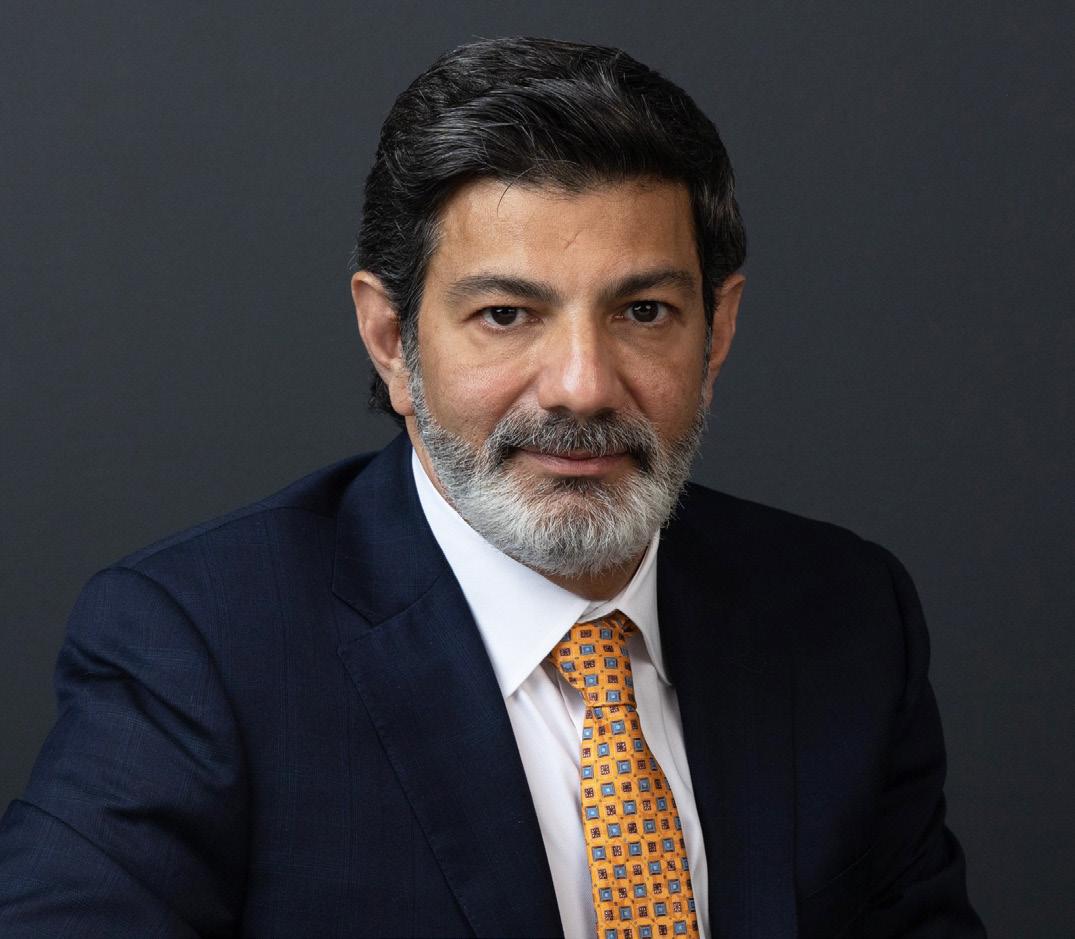
envision AI becoming deeply embedded in decision-making structures, not just as a supplementary tool but as a strategic partner
Sustainability is another key pillar. DV8 optimizes its AI models for energy efficiency, minimizing computational waste and reducing the environmental impact of AI-driven operations.
Inclusivity is equally important. DV8 designs AI solutions that serve diverse populations, ensuring fairness and accessibility in decisionmaking processes. A prime example is EduOps AI™, which features adaptive learning modules tailored for students with disabilities, making quality education more inclusive than ever.
To learn more about how DV8 Infosystems is leading AI innovation, visit www.dv8infosystems. com or contact us at info@dv8infosystems.com.
Over the next decade, DV8 Infosystems envisions AI becoming deeply embedded
in decision-making structures, not just as a supplementary tool but as a strategic partner.
“One of the most exciting developments on the horizon is next-generation AI agents that merge real-time data analysis with predictive simulation,” Bill notes. These AI agents will enable businesses to model multiple strategic scenarios before making critical decisions, significantly enhancing business agility and risk management.
The future of AI isn’t just about automation or efficiency. It’s about reshaping industries, driving responsible innovation, and creating intelligent systems that think, adapt, and evolve.
With an unwavering commitment to pushing AI beyond conventional boundaries while setting the gold standard for ethical, adaptive intelligence, DV8 Infosystems is not just leading the charge—it is defining the future of AI-driven transformation.
Doug Stephens, Founder & President, Retail Prophet & 3X International Bestselling Author
Hi Doug. Could you share your journey to becoming an expert in your current position?
I got into retail in my late 20’s beginning on the front lines and began moving vertically and laterally through a number of retail companies in both Canada and the United States. Over the course of over 20 years, I was fortunate to be exposed to almost every work stream and discipline in retail from training and development, operations management
and marketing through to franchise sales and eventually General Management.
One overarching observation I formed about the retail industry was that it was critically short-sighted in its outlook. So, in 2009 in the midst of unprecedented economic, social, technological upheaval I left corporate to establish my own consultancy, Retail Prophet, with the goal of focussing exclusively on how all of these historic changes would shape the industry in the years and decades to come.
Whether it’s a website, TikTok post, Instagram story or any other media, it’s where we’re discovering and buying products today
Since that time, I’ve written three books on the future of retail, some of which have been translated into multiple languages. I’ve also had the good fortune to consult to many of the world’s most highly regarded brands and spoken to groups on every continent except Antarctica!
What are the most significant trends shaping the future of retail, and how will they impact the industry?
I believe that we are seeing two monumental shifts taking place in the retail industry today. The first is an historic trading of roles between digital media and physical stores, in which digital media is, in essence becoming “the store”. Digital media is how we browse, gather information, see what’s trending and increasingly buy the things we need. Whether it’s a website, TikTok post, Instagram story or any other media, it’s where we’re discovering and buying products today. The very fact that 74% of consumers turn to Amazon first when considering a purchase confirms this. Some might argue this means physical retail will become unnecessary, but I disagree. I believe that physical stores are transitioning to become a media channel. And not just a media channel but also the most powerful and measurable media channel a brand has at its disposal.
The second is that we are coming to the end of an era in retail whereby the traditional pillars of competitive advantage (selection, convenience, price, service etc.) are giving way. They are going to be replaced by new, asymmetrical advantages. For example, if someone had told you in 1990 that by 2024 competitive advantage in retail would mean a company producing its own hydrogen fuel, you’d have thought they

AI will become an ingredient in just about every other technology, system or platform that retailers use
were crazy. But today, Amazon is doing just that. Producing its own hydrogen to power forklifts and other machinery in its Aurora Colorado facility. Not only will the move help them meet carbon reduction goals, it’s also a bet that within a decade hydrogen will be cheaper than carbon-based fuels. Most retail companies today simply aren’t thinking like this.

How will technology, such as AI and AR, continue to transform the retail experience?
The best analogy I can think of for how AI will transform retail is how the advent of electricity shaped modern society. AI will become an ingredient in just about every other technology, system or platform that retailers use. Like
electricity it will be powering so many aspects of our lives we’ll be challenged to get by without it. As for Augmented Reality, it’s a wonderful tool that has a wide range of uses, from virtual try-ons of apparel products to assistance in navigating retail spaces. But like any tool it’s important that it not be used gratuitously and only where it yields some clear benefit for the consumer.
What role will sustainability play in shaping the future of retail, and how can companies prioritize eco-friendliness?
The hard truth is that consumers don’t prioritize sustainability and neither do most retail companies. Most consumers want what they want at an affordable price and corporations just want to sell lots of stuff and make their numbers. That’s the reality. However, the real pressure for companies to become sustainable is coming from the institutional investment community. Investors are demanding information from companies on their sustainability and labour practices so that they can make informed decisions with respect to where they put their capital. Environmental damage, unfair labour practices, and other corporate governance issues represent risks to capital that investors are increasingly unprepared to tolerate. So, if companies want investment, they’re having to get their houses in order as it applies to ESG.
What has been your most career-defining moment that you are proud of?
I’ve had so many memorable experiences, but I’d have to say seeing my first book sitting on a bookstore shelf alongside business authors who I have such great respect for, was sort of transformational for me.
If you could have a one-hour meeting with someone famous who is alive, who would it be and why?
Alexandria Ocasio-Cortez. Primarily because I believe at some point in history she’ll become President of the United States. But more importantly because I think she represents a vision for the future that will soon become non-negotiable for both individuals
and businesses. She’s young, brilliant and I believe really in touch with the cultural and economic zeitgeist that’s causing so much suffering in the world today.
Is there a particular person you are grateful for who helped get you to where you are?
My wife Meredith. I simply could not have accomplished what I have without her love, encouragement and support.
How do you keep your mind healthy and stay resilient? And how do you motivate your team?
I love music and try to play guitar everyday when I’m home. I find music really activates my creativity and acuity. I also try to keep physically fit, especially when I’m doing a lot of travelling. Beyond that, I try to expose myself to a wide range of topics from pop culture, philosophy and technology to politics, science and economics. The best thing I can give to my clients is a wide and broadly informed lens to see the world through. Ultimately consumer behavior is a reflection of everything we as a society are exposed to, so the more in touch you can be with what’s happening, the more likely it is that you’ll understand what’s motivating consumers.
What is your favorite quote?
I have a few but one is, “If you can dream it, you can do it.” - Walt Disney
Where do you see yourself in the next 5 years?
My hope is to be touring a new book on the future of competitive advantage in business.

What advice would you give to anyone starting out on their career in your industry?
Obsession is the only thing that will push you to study, think and work longer and harder than your competitors
Find something (a point of view, belief or area of work) to become obsessive about. Obsession is the only thing that will push you to study, think and work longer and harder than your competitors. Obsession is what will power you though failure. And it is obsession that will almost certainly drive your success to heights you didn’t imagine being possible.
Justin Murray, Ventures Associate at Plug and Play Tech Center
New Jersey has been known as a hub for innovation and has paved the way for a forward-looking ecosystem that embodies the latest technological trends. This hub for innovation started during the Industrial Revolution, with Edison’s inventions at Menlo Park, the invention of America’s first steam locomotive, the incorporation of Johnson & Johnson, and many more. Edison’s groundbreaking work with the light bulb, phonograph, and motion picture camera laid the foundation for what would become a thriving culture of innovation.
However, NJ’s contributions to technology & innovation didn’t halt at Edison. Bell Labs,
located in Murray Hill, became an influential force behind some of the most important advancements of the 20th century, especially the invention of the transistor and laser. This culture of invention and research is still deeply ingrained in the state’s DNA, setting the stage for the tech boom we see today.
Trends Across Fintech, AI, and Startup
Fast forward to today, and New Jersey is evolving, becoming a center for modern technological trends. Due to its location, the state plays a major role in the intersection of finance and technology. Fintech startups are finding a home in New Jersey, thanks to
The emergence of artificial intelligence (AI) and machine learning (ML) is a part of a surge of new startups and initiatives

Justin Murray has been building the technologyandstartupecosysteminNew Jerseyforthepast6years.Hisexperience has been on the operator side of earlystage tech startups like Black Crow AI and on the community side through his previous involvement with TechUnited: NJ.AtPlugandPlay,JustinistheVentures lead for the northeast - focused on fintech & insurtech investments through the NJ FAST initiative and through the local ecosystem. He will also be focused on bridging the gap between NJ/NYC and Silicon Valley.
accelerator programs like NJ FAST, which I’ve had the pleasure of working on in my role at Plug and Play, the world’s largest innovation platform. These programs help provide a soft landing and support for companies building in financial products, insurance technology (Insurtech), digital payments, and more.
The emergence of artificial intelligence (AI) and machine learning (ML) is a part of a surge of new startups and initiatives. We are seeing AI applications expand across sectors like healthcare, finance, and cybersecurity. Much is made about the potential for the AI wave to disrupt large enterprises, while the opportunity to enable the Fortune 1000 (and beyond) is the opportunity most entrepreneurs are working to build. These companies are benefiting from the proximity to New York’s financial markets while enjoying the lower costs and supportive infrastructure that New Jersey provides. This has been noticed across the country as well, pushing innovation and growth in cities like Warsaw, IN, and Topeka, KS, where Plug and Play has played an active role in supercharging interactions between the startup community, private, and public sector. While still the largest startup hubs in the country, innovative solutions are increasingly distributed beyond New York City and San Francisco.
NJ benefits from having amongst the best talent in the world, including institutions like Princeton University, Rutgers, and Stevens Institute of Technology, providing the knowledge centers for the future of STEM. Many of the state’s AI and fintech innovations are being driven by research coming out of these institutions, and partnerships between
universities and startups are fostering an environment where ideas can flourish.
While fintech and AI are trending now, New Jersey’s future is also being shaped by its push toward a more sustainable future. Startups like Physis Investment are bridging the gap between investment intelligence and sustainable insights. New technologies are causing a need for more energy all while the world has an urgent need to address climate change, with NJ positioning itself as a leader in renewable energy. The state has already committed to becoming a central player in the offshore wind industry, with projects like The New Jersey Wind Port, an offshore wind project creating both clean energy and jobs for the state.
This shift goes further than energy. NJ’s ecosystem is seeing an increase in companies focused on environmental technology, sustainable manufacturing, and green infrastructure. From hardtech startups developing energy-efficient materials to those working on smart grid technology, the state is aligning itself with the global trend toward sustainability.
This sustainable focus will improve the state’s economy while helping New Jersey become a model for other regions looking to become greener. Startups and founders who focus on eco-friendly solutions will find an increasing number of support and opportunities to thrive in the Garden State.
Through growing up seeing the improvements across NJ’s ecosystem, it’s been noticeable
Priya Reddy, VP of Enterprise Data Management & Chief Data Officer, Reprise Financial
Hi Priya. Can you please provide a brief overview of your background and experience in the fintech industry?
With over two decades of experience in data and technology, I have dedicated my career to transforming data into a strategic asset that drives business growth and innovation. As the VP of Enterprise Data Management at Reprise Financial, I have been instrumental in driving digital transformation and enhancing data management, significantly improving accessible lending products. My pivotal role in establishing the Enterprise Data Management department led to scalable solutions that boosted the company’s operations.
My expertise spans Big Data, cloud and traditional architecture, and service delivery I expertly manage data warehouses and data lakes, advance reporting and analytics capabilities, oversee machine learning initiatives, and manage backend databases for application development, ensuring a reliable and efficient data supply for the company’s digital platforms. I’ve led initiatives that optimize data governance and compliance while empowering teams to harness data for decisionmaking and driving tangible business outcomes. My focus includes leveraging data gravity, identifying the most appropriate platforms for a hybrid strategy, and implementing a cloud-centric approach to balance security and innovation.
Managing data privacy and governance, especially with evolving global regulations, is a complex but essential task

Priya Reddy is the VP of Enterprise Data Management and Chief Data Officer at Reprise Financial, with over two decades of experience in Fintech and Financial Services. As a data leader, she thrives at the intersection of business and technology, architecting, implementing, and innovating enterprise data strategies to unleash potential and competitive edge. Recognized on CDO Magazine’s ‘Global Data Power Women List’ and as an AI100 award winner at MachineCon 2024, Priya is committed to empowering the next generation of women in tech through her nonprofit work and dedication to fostering innovation and diversity.
Recently, in an exclusive interview with Digital First Magazine, Priya shared her professional trajectory, insights on diversity and inclusion in tech, the best piece of advice she has ever received, future plans, words of wisdom, and much more. The following excerpts are taken from the interview.
Before joining Reprise, my work at Skopos Financial and Santander Consumer USA significantly contributed to business growth through vital data insights. Known for my dynamic leadership, I am committed to customer-centricity, modern delivery methods, and continuous improvement, building highperforming teams and fostering a culture that enhances business outcomes. In addition, I collaborate closely with analytics and modelbuilding teams, providing the data and platforms necessary for advanced analytics and automation, helping the organization prioritize efforts and drive value. Beyond my professional role, I am dedicated to empowering girls and women in STEM, serving on the boards of various nonprofit organizations and contributing to CDO Magazine’s global editorial board.
What are the most rewarding parts of your current role, and why?
The most rewarding part of my role is twofold: leading and inspiring a high-performing team, and delivering tangible business value.
I take immense satisfaction in guiding my team of data professionals as we tackle complex challenges and transform them into innovative solutions that drive both customer satisfaction and business success. Every day,
I see how our efforts directly contribute to the company’s growth—whether it’s by enhancing customer experiences, ensuring seamless data operations, or providing high-quality data for strategic decision-making.
I am deeply committed to my team’s growth, supporting them where and when they need it, whether that’s problem-solving together, learning new technologies, or helping them connect their personal goals to our business
objectives. I actively invest in their development by bringing in training opportunities and creating pathways for both business acumen and technical advancements. The impact we make is not just measured in numbers, but in the real stories of how our work improves lives. Being alongside my team in these endeavors is what makes my role truly rewarding.
are the most significant data management challenges businesses are currently facing, and how can we address them?
In today’s digital age, businesses face several significant data management challenges, including integrating AI and machine learning technologies, navigating the increasing complexity of data privacy regulations, and ensuring real-time data access across multiple platforms. Addressing these challenges requires a proactive approach to data governance, ensuring that data is not only accurate and compliant but also readily accessible for decision-making.
At Reprise Financial, we have built a robust data architecture that supports scalable and secure data operations, laying a strong foundation aligned with our business goals to drive sustainable growth. My involvement with CDO Magazine allows me to highlight emerging trends and best practices, guiding organizations in overcoming these challenges. Additionally, through TheAssociation.ai, I advocate for ethical AI practices that ensure data is managed responsibly, fostering trust and compliance across industries.
Managing data privacy and governance, especially with evolving global regulations, is a complex but essential task. Companies need to take a proactive approach by anticipating
which is essential for long-term success. Balancing innovation with security is key, and we achieve this by fostering a culture where both go hand in hand.
Navigating the complexities of data in the AI era brings new demands and opportunities for enterprise data teams. Internally, these teams must ensure that data pipelines are robust and scalable to handle diverse data sources in real time. Data governance is crucial for maintaining accuracy, consistency, and compliance. Think of it like preparing a gourmet meal – AI is the chef, data is the ingredient, and data teams are the sous-chefs, ensuring everything is of the highest quality before it’s utilized.
Externally, we face rapidly evolving technology platforms and stringent privacy regulations. Additionally, data democratization presents challenges, requiring careful consideration of appropriate use cases and the management of potential biases. Navigating these complexities is like walking a tightrope, balancing internal demands for data quality and governance with external forces that shape our technological landscape.
What impact do you believe increased diversity and inclusion would have on innovation, creativity, and progress in your industry?
Diversity and inclusion are vital to fostering innovation and creativity in the Financial Servies and fintech industry. A diverse team brings a range of perspectives and ideas, which leads to more innovative solutions that resonate with a broader audience. I prioritize creating an inclusive environment where everyone feels empowered to contribute their unique insights. This not only drives innovation but also enhances
My guiding principle is simple: Take care of your people, and your people will take care of the business


our ability to solve complex challenges in a way that reflects the diverse needs of our customers. By embracing diversity, we ensure that our innovations are not just technically sound but also culturally relevant and impactful. This commitment extends to my role at The GEMS Camp, where I work to expand access to STEM fields for young women, ensuring they have the tools and opportunities to succeed.
The meaning of leadership can change from one era to the other, how would you define the meaning of leadership today?
Leadership today is about adaptability, empathy, and the ability to inspire others. It’s about leading by example, fostering a culture of innovation, and empowering teams to achieve their best. In my leadership journey, I focus on creating an environment where my team feels included, valued, supported, and motivated to contribute to the company’s success. True leadership involves not just guiding your team but also learning from them. It’s essential to balance the needs of the business with the well-being of your people, ensuring that everyone has the opportunity to grow and thrive. My guiding principle is simple: Take care of your people, and your people will take care of the business.
However, leadership also comes with its challenges. Sometimes, leaders must stand tall, alone. The weight of leadership can be a heavy and lonely responsibility. Leaders often face tough decisions and situations where they must make difficult choices, even if it means standing alone. Leadership often involves taking responsibility and guiding others, even in challenging circumstances. Another key belief I hold is that the only way to lead is by
example - lead by example, creating leaders along the way. By promoting ethical practices and staying ahead of industry trends, leaders can navigate the complexities of today’s fastpaced world while cultivating a resilient and innovative organization.
In your academic or work career, were there any mentors who have helped you grow along the way? What’s the best piece of advice you have ever received?
Throughout my career, I’ve had the privilege of working with some remarkable individuals who have influenced my leadership style, even though I didn’t have formal mentors. Looking back, I wish I had access to the mentorship and communities that are available today, as they could have accelerated my career journey. However, it’s never too late to embrace growth, and in recent years, I’ve become actively involved in several organizations that provide these valuable connections and insights.
One of the best pieces of advice I’ve received—and one that has become a guiding principle for me is to “always stay curious and never stop learning.” This mindset has driven me to continuously seek new knowledge, whether it’s staying updated with the latest developments in AI or learning from the experiences of those I work with. A commitment to lifelong learning is essential for personal and professional growth, and it’s something I actively encourage within my teams and communities.
The infrastructure for growth in data and technology is better now than ever before, with countless resources and networks available to
support anyone looking to advance their career. My advice is to make your growth a priority so that you can, in turn, empower others. As Maya Angelou wisely said, “Do the best you can until you know better. Then when you know better, do better.” By focusing on continuous learning and leveraging the incredible resources available today, you can achieve your goals and help others do the same.
What is one of your favorite parts of the workweek? How does it encourage or inspire you? Do you have a favorite way to recharge during the workday?
One of my favorite parts of the workweek is our team’s “Celebrations” session. This is a dedicated time when we come together to share our successes, learnings, and even challenges. It’s more than just a routine meeting; it’s a moment of reflection and inspiration that reminds us of the impact we make through our work. These sessions reinforce the sense of purpose within the team, showing how each contribution aligns with our company’s broader mission. It’s a powerful way to acknowledge our collective achievements and foster a culture of continuous improvement and excellence.
As someone who is deeply committed to building high-performing teams, these moments are crucial. They not only motivate the team but also reinforce the values of accountability, honesty, and collaboration. My role encompasses various aspects of data management, from data engineering and architecture to quality assurance and governance. Leading such a diverse and talented group requires not just strategic
oversight but also the ability to create an environment where every team member feels supported and empowered. By removing roadblocks and ensuring alignment with our company’s goals, I help cultivate a culture where excellence is the standard.
To recharge during the workday, I often take short breaks to clear my mind, whether by taking a walk, practicing mindfulness, or simply stepping away from my desk for a few moments. These small pauses are essential for staying focused and energized, allowing me to tackle the day’s challenges with a fresh perspective. In a role that demands both strategic vision and meticulous attention to detail, maintaining this balance is key to sustaining both personal effectiveness and team performance.
Overall, the “Celebrations” session is more than just a highlight of my week; it’s a reflection of my leadership philosophy. By celebrating wins and continuously driving improvement, we create a work environment that not only meets but exceeds expectations. It’s about building a team that is not just capable but also inspired to achieve excellence in everything we do.
Where do you see yourself in the next 5 years?
In the next five years, I see myself continuing to lead transformative data initiatives that drive innovation and growth. I aim to take on broader leadership responsibilities, influencing strategic decisions at an organizational level while mentoring the next generation of data professionals. My goal is to remain at the forefront of the ever-evolving data and AI space,
leveraging my expertise to create data-driven solutions that not only address today’s challenges but also anticipate future needs.
I also plan to expand my contributions to nonprofit organizations focused on STEM and technology, ensuring that the next generation of women in these fields are well-prepared and empowered. Additionally, I am committed to thought leadership, particularly in Data and AI, creating cultures of innovation, and fostering diversity and inclusion. Through speaking engagements and cross-industry collaborations, I will continue to share my knowledge and expertise, making a meaningful impact across various sectors and helping to shape the future of data and AI.
What advice would you give to women who want to enter the tech industry?
My advice to women aspiring to enter the tech industry is to embrace your uniqueness and never doubt the value you bring to the table. The tech industry needs diverse voices and perspectives, and your contributions are invaluable. As a Board Member of The GEMS Camp and an active member of CHIEF and WLDA, I work to ensure that women have the tools and support they need to succeed in tech. Surround yourself with mentors and peers who support your growth, and don’t be afraid to take risks. Continuous learning and adaptability are key in this fast-paced industry, so stay curious, stay connected, and always be open to new opportunities. Remember, the tech industry is not just about technology, it’s about people, innovation, and making a difference.
Want to Sell or find Investor for your Business?
Attila Algan, Chief Executive Officer, Cognitiwe
Hi Attila. Please share your background and areas of expertise.
While I hold a Bachelor’s degree in Electronic Engineering, my career has spanned international leadership roles in launching and managing brands, devices, and innovative solutions. I was fortunate to be part of the smart devices and consumer services boom, a pinnacle of innovation at the time. It was an incredible journey in a fast-paced, competitive environment, even in the market-making phase
where educating customers was essential. This experience provided me with a deep understanding of how to bring innovation to market and the strategies needed to execute goto-market (GTM) plans and scale rapidly in new and uncertain markets.
As CEO of Cognitiwe, this experience has been invaluable. It has shaped my ability to lead the company through the challenges of scaling AI solutions in the retail sector, where both innovation and market education are crucial.
Like many past technological advancements, AI will become so ingrained in our lives that we’ll stop seeing it as separate from our daily activities
Attila Algan is the co-founder and CEO of Cognitiwe, an innovative AI-driven company focused on transforming the retail industry by reducing waste and improving operational efficiency. With over 25 years of experience in the tech sector, Attila has held leadership roles at global companies like Nokia, Samsung, and TIM, where he honed his expertise in product development,businessgrowth,andinternational marketexpansion.Passionateabouttechnology and entrepreneurship, Attila is committed to driving sustainable solutions through AI. He is also a mentor to aspiring entrepreneurs and enjoys sharing his knowledge with the next generation of business leaders.
Recently, in an exclusive interview with Digital First Magazine, Attila shared his professional trajectory, the inspiration behind establishing Cognitiwe, his favorite quote, future plans, words of wisdom, and much more. The following excerpts are taken from the interview.


My background in navigating uncertain and evolving markets allows me to guide Cognitiwe in driving sustainability and profitability for our clients, ensuring we remain agile and competitive as we expand.
What inspired you to start Cognitiwe AI, and what problem are you trying to solve?
We came up with the idea for Cognitiwe towards the end of 2020, during the COVID pandemic. The global supply chain was in crisis, food shortages were widespread, and retailers saw profits turn into significant losses. Issues like food waste, especially in fresh produce, and out-of-stock items were prevalent. Even today, retailers face enormous losses from these challenges, with supermarkets discarding over 10% of their fresh produce annually.
This sparked the idea of using AI to tackle these problems, and Cognitiwe was born. We engaged with key players in the retail sector, and through discussions with prospective customers, we gained a deeper understanding of the need and how to effectively address it. Once we solidified our approach, the journey of Cognitiwe truly began.
What role do you see AI playing in driving business transformation in various industries?
AI will undoubtedly transform all aspects of our lives, including business methods and practices. It will play a pivotal role in driving business transformation by automating processes, enhancing decision-making, and unlocking new levels of efficiency and innovation. But let me clarify: it’s not AI alone that will transform everything—it’s the creativity of humans using AI that will lead this change.
Staying current with emerging trends and advancements in AI requires a continuous, multifaceted approach
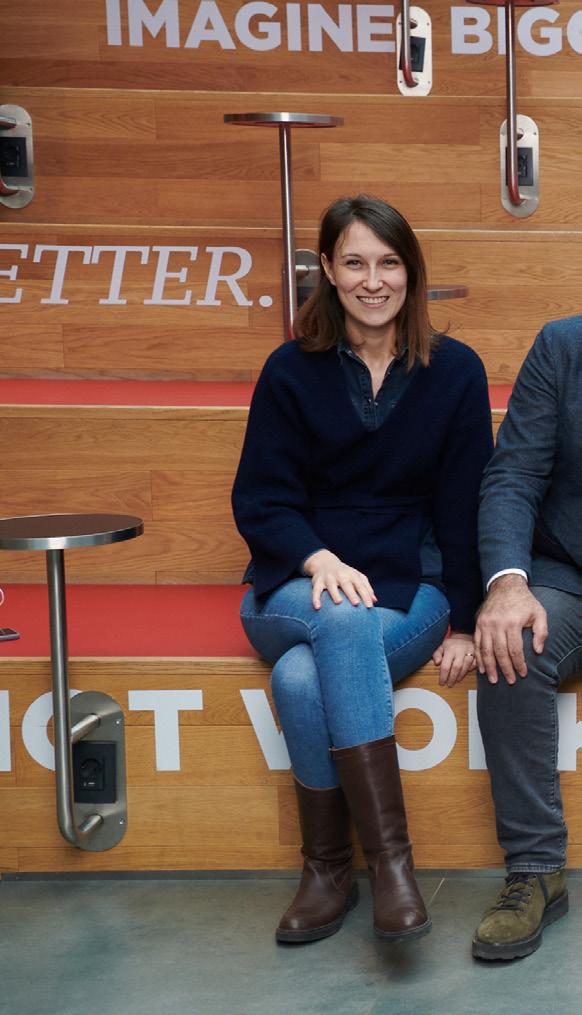
the reasoning behind these insights is clear, so stakeholders can trust the recommendations. This builds confidence in the system and helps users make informed decisions based on AI outputs. Additionally, we prioritize ethical AI practices, ensuring that our algorithms don’t act as “black boxes.” This means regularly auditing our models, providing clear documentation, and maintaining open communication with users so they can understand how our systems work. The goal is to foster both innovation and trust by making AI both cutting-edge and transparent.
If you could have a one-hour meeting with someone famous who is alive, who would it be and why?
I would love to have a one-hour meeting with Bernard Arnault, the founder and CEO of LVMH. Having spent my entire career in technology, where the focus is often on volume, market share, repeat sales, and mass marketing, it would be fascinating to learn from someone whose approach is completely different. Arnault has built a business empire by prioritizing value over volume, individuality over mass appeal,
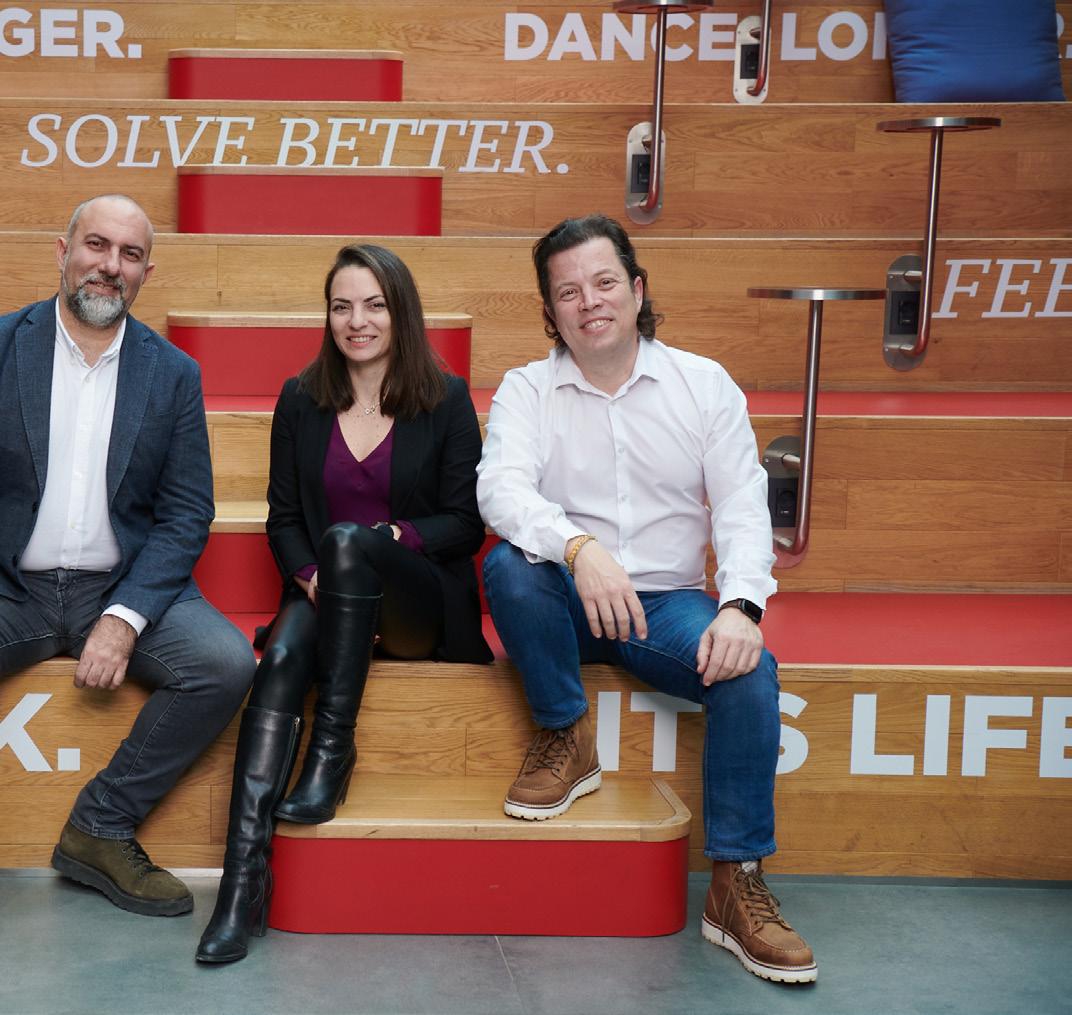
and subtle, high-end marketing rather than loud, widespread campaigns. Understanding his mindset and approach to creating long-term value in luxury would be incredibly insightful and enriching for me.
How do you stay current with emerging trends and advancements in AI?
Staying current with emerging trends and advancements in AI requires a continuous, multifaceted approach. Networking with industry peers, participating in webinars, and staying
active in AI communities are essential. I regularly engage with research papers, attend conferences, and follow leading AI organizations and academic institutions to remain informed about the latest developments. However, my personal engagement alone isn’t enough. At Cognitiwe, we’ve embedded this mindset into our company culture. We encourage our team to participate in academic research, explore new tools, and experiment with the latest technologies, ensuring we maintain a hands-on approach to learning. Collaborating with AI experts and related fields

Leaders must ensure that their AI systems are not only groundbreaking but also transparent, trustworthy, and responsible
Peggy tsAI, Chief Data Officer, BigID
Hi Peggy. Can you share your professional journey and how you became a Chief Data Officer?
I spent the first part of my career working in data and technology in financial services companies. I worked on Wall Street in companies such as S&P Global, AIG and Morgan Stanley as business analysts and data stewards. I focused on compliance and digital transformation projects where data was the main focus in the integration. I worked with global teams to define, standardize and measure the quality of their data using enterprise tools and governance frameworks. In all my roles, I enjoyed
researching and evaluating new technologies to help improve data management processes which led me to work for a product company, BigID. I started out as VP of Data but quickly expanded my customer and product roles to become the company’s first Chief Data Officer. As the Chief Data Officer of a product company, I work internally on improving our security policies with data standards and help to govern our internal AI practices through a newly created AI Governance Council. I am also focused on business development activities that build the company’s brand in data, security and privacy.
Data ethics and responsible AI has always been a priority for me in terms of the fair usage of data

Data professionals need to be able to develop strategic skills in knowing the business operations and linking the benefits of data to the company
What makes your role truly meaningful and impactful to you?
My role is meaningful to me because it has given me the freedom to explore the latest trends in data, analytics and AI. I am on the cutting edge of the conversations that other data executives are focused on and in the process of implementing inside their organization. I build relationships with data leaders across different industries and tie together the synergies and trends that I see from a strategic perspective. It is very impactful for me to identify these commonalities and share best practices across industries with data leaders. I enjoy helping and mentoring leaders, so my role gives me the unique raised profile to do so. In addition, I participate in industry working groups, data forums and academic programs that all work towards educating and elevating the entire community.
What are your thoughts on data ethics and responsible AI?
Data ethics and responsible AI has always been a priority for me in terms of the fair usage of data. I started talking about AI Governance more than 8 years ago when I noticed it missing on the agenda of data conferences. For me, this starts with data transparency in understanding where data is sourced, how it is curated and why it has been collected. The second part of ethical and responsible AI usage is dependent on the data engineer to be responsible in choosing the data sets to create and train the models. Lastly it is up to the analyst to interpret and evaluate the results of the AI. There can be many forms of conscious and subconscious bias that are introduced along the process which can be mitigated through various guardrails and review committees. I believe ethics is a continuous
process of evaluating the fair and transparent usage and application of AI that should reflect the principles and values of the company and customers that it serves.
What emerging trends or technologies in the data space are you most excited about in the next 12-18 months?
I am most excited about the continued maturity of data management for many industries. I am seeing more focus on data literacy and AI education for many professionals that are outside the data role which makes me happy that one data the onboarding of all new employees will include data literacy. Outside of the expansion of data, I am excited to see the data governance processes to be integrated with Generative AI to assist with labeling data, creating descriptions for table structures, summarizing data tasks and identifying next steps for minimizing workflow lags. Due to the volume and scale of data - esp in unstructured data – manual intervention is still required for cross-functional teams to manage and analyze their data.
What skills or training do you think are essential for data professionals to succeed in the future?
In order for data professionals to be successful in the future, s/he needs to stay current with the latest technologies and understand how it fits in with current data technologies and architecture while being able to explain the business impact and benefits. Data professionals need to be able to develop strategic skills in knowing the business operations and linking the benefits of data to the company. Lastly, data professionals need to constantly improve their communication such as presentation skills – in terms of writing
innovate with. I always get a surge of energy with other creatives to work on new projects and initiatives that I am even more mentally focused! I believe this extends to motivating teams as well. I believe each team member needs to be engaged and ultimately aligned to the overall mission and objectives. While some of the daily work can seem redundant, each task leads to a greater purpose. There needs to be continued excitement and recognition of the hard work that the team does to meet the team goals.
How do you achieve work-life balance?
I don’t have a work-life balance. I don’t believe there is a balance because it means there is a difference between my work and my personal life. I believe in a work-life continuum where in the most extreme part of the grid, I have my Chief Data Officer job along with my adjunct faculty and teaching roles along with my data leadership roles in the community. I weave in these responsibilities and time commitments with my family time and personal interests. Often, I enjoy mixing the two together where I enjoy eating at a nice restaurant when I am traveling to a different city for work. Or on the rare occasion, my family can join me while on an extended work trip to another country. I am grateful that I am passionate about my work which is why I take on additional roles that become part of my personal life.
Where do you see yourself in the next 5 years?
I personally hate answering these questions because I believe this closes me to new undefined opportunities. If I were to ask myself this question 5 years ago, I would not have imagined my current role and situation. However, there are
certain values that I will strive for in my future career which include working in new emerging technologies, being part of an energetic team that supports risk-taking and maverick thinking and working in a culture that rewards both risk takers and loyalists. I’m also keen to new challenges, developing new skillsets and being comfortable with the uncomfortable. I once told a manager that I like putting myself in uncomfortable situations because I believe that is how I test my limits and grow.
What message or advice would you give to young women or girls who are interested in pursuing a career in data, and how can we work together to create a more inclusive and equitable industry? Firstly, for young women (or men) who are interested in pursuing a career in data, there are more resources and groups that are available than before to learn new skills and grow your network. The most important advice I have is to take the initiative and look beyond your current team and company. There are many virtual and in-person opportunities to meet and learn from your peers in other industries. I encourage everyone to take advantage of these opportunities to find a mentor and to build a support system to help you achieve your data goals. It is important to build your data, analytical and technical knowledge but also to develop your personal brand. The personal brand includes demonstrating your knowledge and expertise at public conferences, published white papers or on social media. Unfortunately, the industry is still not equitable and inclusive to all diverse backgrounds, but I believe this is slowly changing. It can only be improved by bridging support, sharing knowledge and sponsoring others within your network.
Btissam Laaouina, Cybersecurity Manager
Every company has to be extremely careful of the security of their data and infrastructure since the frequency and complexity of cyber attacks demand. Cybersecurity is no longer a topic of exclusive concern for security departments nowadays. It’s not only about protecting the network; it’s also about being extremely careful in preserving every element of your IT supply chain—including hardware, software, and other vital parts.
When it comes to security, visibility is paramount. To facilitate Procurement, Compliance, and rapid vulnerability detection for SecOps, software
components are documented in the Software Bill of Materials (SBOM). A similar tool for Procurement and Compliance is the Hardware Bill of Materials (HBOM), which documents physical components and highlights potential security threats.
Still, why limit oneself to just hardware and software? Additional security may be possible if this strategy was extended to include the whole supply chain. The overall ecosystem’s security could be enhanced with the use of a SCBOM (Supply Chain Bill of Materials), which would give a comprehensive overview and aid in reducing risks and vulnerabilities related to external suppliers and third-party components.
One approach to maintaining a high degree of protection without overburdening IT personnel is to automate security procedures
Integrating the tenets of Visibility, simplicity, and awareness is the key to developing a robust and versatile cybersecurity strategy
How security solutions are made and managed is largely determined by how simple they are. Keeping things simple helps keep systems from making mistakes or being set up incorrectly, which can put them at risk. Solutions that are clear and easy to understand are more effective and less likely to cause mistakes. Automating security procedures is one way to keep a high level of protection without putting too much stress on IT staff. Systems can be better protected from human error and improper configuration when things are kept simple. There will be fewer errors and more success with solutions that are simple and straightforward. One approach to maintaining a high degree of protection without overburdening IT personnel is to automate security procedures.
Being vigilant is crucial because humans are often considered the security plan’s weakest link. Above all else, workers need to be informed about potential dangers and updated on any new ones on a regular basis. Practical exercises, such as phishing simulations, greatly assist staff members in understanding how to react to attacks. Companies can maximize the impact of these
initiatives and demonstrate their worth to senior executives by establishing concrete objectives for awareness campaigns and monitoring their progress. So Envision a doctor or nurse who has never done surgery before and has only studied in theory. It is impossible to be completely prepared for a real-world scenario with just theoretical knowledge of the concepts and procedures, no matter how thoroughly one has studied them. Similarly, while knowing the theory behind cybersecurity is important, putting that knowledge into practice in the real world is often more challenging. It is critical to turn our theoretical understanding of cybersecurity into practical strategies to deal with real security threats as we work to improve our cybersecurity practices. Integrating the tenets of Visibility, simplicity, and awareness is the key to developing a robust and versatile cybersecurity strategy. Tools such as SBOM, HBOM, and SCBOM provide a comprehensive view of the supply chain by safeguarding software and hardware. Simplified security systems reduce risks and make business operations easier. Conversely, a strong security culture and ongoing training improve the company’s ability to deal with threats.





